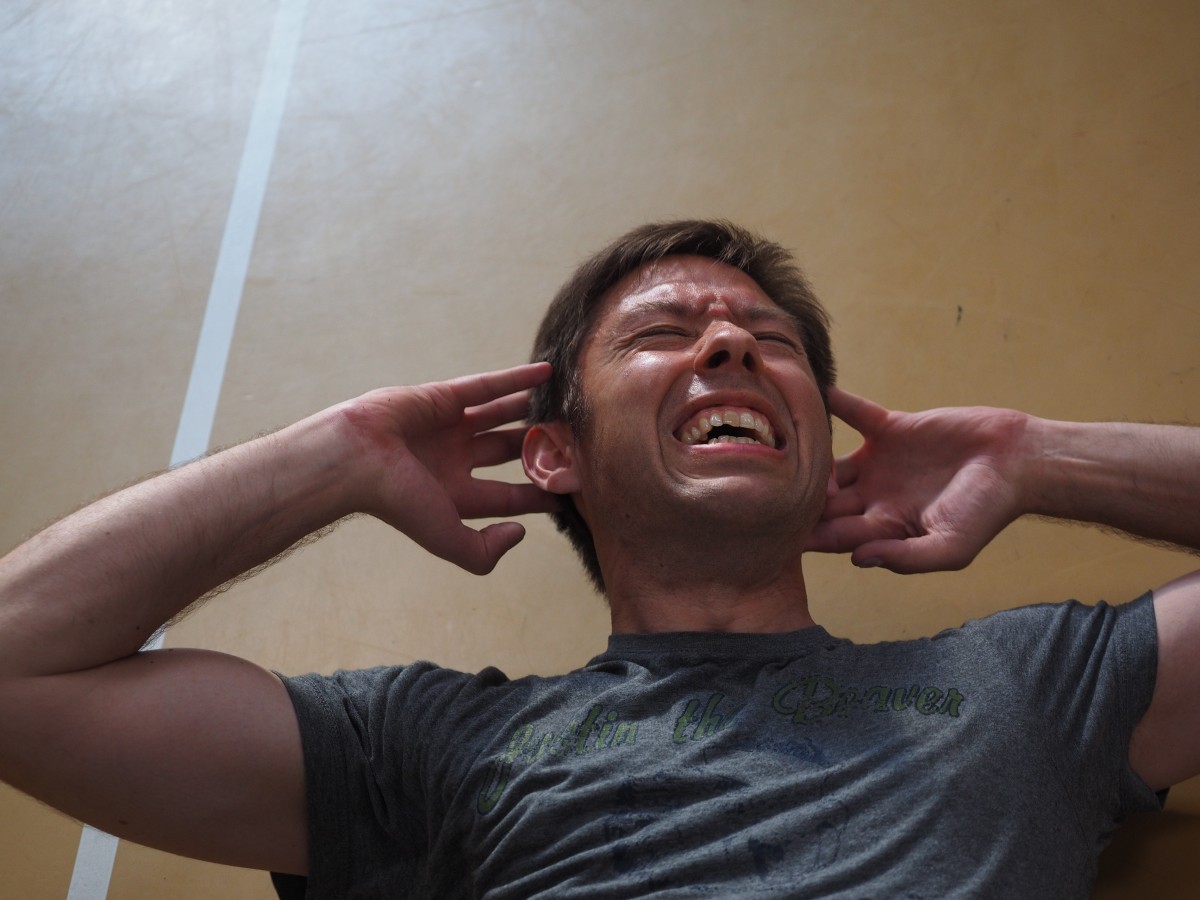Blog
Meditations
Are Conspiracy Theories Your Religion?
Thursday, January 21, 2021
The other day, I read a fascinating article (https://medium.com/curiouserinstitute/a-game-designers-analysis-of-qanon-580972548be5) posted by my brother and friend Tim Thompson. In it, the author argues that QAnon functions much like the live-action games he designs for a living. In particular, he points to a quirk of human psychology that is significant to both. It’s called apophenia, and it’s the tendency to see a pattern and form connections where none exist.
This is why, for instance, most people will look at the overflow faceplate in the picture and see a face. It is not a face. It is not even designed to look like a face. Nonetheless, we glance at the plumbing fixture and see eyes, nose, and face.
We also enjoy figuring things out for ourselves. We get a dopamine hit out of putting a puzzle together, and our memory does a better job of retaining the answers we arrive at than the ones that are handed to us. We tend to be more emotionally invested in those answers too.
Other human blind spots play into this as well. We are communal creatures and are prone to accepting what our community accepts, whether in person or online. Conversely, we mistrust those we consider to be “other” and regard what they say with skepticism.
QAnon, and other online conspiracy theories much in vogue, exploit all of these things. They feed their audiences “breadcrumbs”—isolated, random facts—and encourage them to assemble the breadcrumbs into a pattern. They suggest that most media outlets are fundamentally deceptive, but that the discerning mind (note the appeal of “I figured this out! I’m smarter than everyone else!”) can ferret out the truth. They provide a community of true believers to help enlighten new initiates. Once someone has bought in, they are nearly immune to counterclaims.
The author argues, and I agree, that this infatuation with conspiracy has religious overtones. Faith, after all, is the evidence of things hoped for, the conviction of things not seen. I don’t think that a bunch of random celebrities flashing hand signs is the evidentiary equal of eyewitnesses who died for their faith. Nonetheless, in both cases, once we put it all together, our new conviction transforms our worldview.
This is a problem because the Christian worldview and the conspiracy-theorist worldview are incompatible. The Christian believes that God controls everything. Nations rise and fall according to His will. However, the QAnon initiate believes that a vast, shadowy conspiracy controls everything, and They are the ones who shape reality according to Their desires (world power, sex trafficking, etc.).
This is blasphemy. It is attributing one of the attributes of God to human beings. In my life, I have read a whole, whole lot of history. From beginning to end, the annals of humankind are filled with blundering, incompetence, false starts, and foolishness. The greatest and most powerful people ever to live (with the sole exception of Jesus) made wagonloads of clumsy mistakes.
By contrast, QAnon posits a cabal that has enrolled hundreds of thousands of people, operated for decades if not centuries, succeeded in its objects, and avoided exposure (“until now!!!”). That doesn’t sound like the human race. It sounds like Ephesians 3:8-11. It sounds like God.
To brethren who are worried about these things, then, I say, “Relax.” Even if there are people out there who want to control or harm you, they aren’t that capable. If they do come to power, it will be clumsy, bloody, and obvious, like the French Revolution, the Russian Revolution, etc. Even the Chinese, as competent as they are, can’t take away democracy in little ole Hong Kong without a lot of noise and stink. Subtle schemes to steal away our freedom are beyond our enemies, as they are beyond all of us.
Instead, worry about God. Trust in Him, and trust that He will keep His promises to you. Here, I can do no better than repeat the words of Isaiah 8:12-13. “Do not call everything a conspiracy these people say is a conspiracy. Do not fear what they fear; do not be terrified. You are to regard only the LORD of Armies as holy. Only He should be feared; only He should be held in awe.”
All of Us Are Mostly Peaceful
Tuesday, January 12, 2021
For much of the past year, many Christians (myself included) have sneered at the Orwellian reporting on the racial unrest following the death of George Floyd. Journalists have repeatedly described the demonstrations as “mostly peaceful”, despite the devastation of entire city blocks. With contemptuous precision, we pointed to the rubble and described the proceedings as “riots”. We declared ourselves unsatisfied with progressive leaders’ apparently lukewarm condemnations of lawlessness.
These days, it seems the shoe is on the other foot. The same journalists who described the protests last summer as “mostly peaceful” do not hesitate to declare the disturbance last Wednesday an insurrection. Now, it is conservative politicians whose condemnations are insufficiently vituperative.
Conversely, I saw on Facebook the other day a report on the events by a brother and friend who was in attendance. He saw tens of thousands of people assembling without violence, and even though he participated in the march to the Capitol, he was not aware that anyone had forced their way inside until he saw it on the news. Though he condemned the violence, he deeply resented the depiction of himself and other innocent attendees as participants in a coup.
All of us, it seems, are mostly peaceful.
This is a difficult truth to acknowledge. In addition to all the other symmetries described above, both sides have attributed the worst behavior of their allies to false-flag enemies. The news last summer was rife with rumors that those who instigated the looting were right-wing extremists. This time around, brethren have continually claimed that the people who broke into the Capitol were antifa pretending to be Trump supporters. Unsurprisingly, the identity of any of these shadowy provocateurs has proven elusive.
The moral of the story is, apparently, that any group of people has bad people in it, and none of us like to admit that about our people. This is true with respect to Democrats and Republicans, and it’s true with respect to the Lord’s church too.
Most of us have had conversations with church-haters (either former members or members on their way out the door) who depict a very different church than the one we know and love. To them, people in churches of Christ are hardhearted, unloving, gossipy, mean-spirited, hypocritical, legalistic, more concerned with politics than Christ, and uninterested in grace. In response, we tend to either a) deny that we see such things, or b) claim that the people who act like that aren’t really Christians.
Sound familiar?
It is a hard thing to listen humbly to one’s enemies. It’s an even harder thing to separate the fiction that they wish were truth from the truth that we wish were fiction. However, if we want to be conformed to the image of Christ, we need a mirror like that.
I believe that most Christians are godly most of the time. However, I also believe that there is evil among us and evil within us, and the words of even the most hateful church critic contain an echo of something that is both ugly and true. Despite our salvation, we remain all too human. Only if we are willing to confront our imperfections honestly can we rise above ourselves.
All Things Working Together for Good
Thursday, December 10, 2020
Even in the often-difficult epistle to the Romans, Romans 8:28 stands out as a difficult passage to understand. It appears to assert a Panglossian worldview—everything is working out for good!—even though we live in a world in which many things appear not to be good. TV preachers seize on this text to promise future prosperity to the folks who send them money, skeptics mock (as Voltaire did), and many Christians are confused by the disconnect between what the passage appears to say and their own lived experience.
As is often the case in Romans, the best way to resolve this textual difficulty is to ignore the verse numbers and read the text in context. When Paul says “all things”, he doesn’t mean literally everything that happens. Instead, he refers to the previous 10 verses, in which he explains how three different things are working together for good.
The first of these things is the physical creation, which he discusses in Romans 8:18-22. Paul is quite clear that the current state of the creation is not good. It is futile, enslaved, and corrupt, and it groans with the pangs of childbirth. Paul was no Pollyanna. He knew, probably better than we do, that this is a fallen world.
However, he also points out that the state of creation is not hopeless but hopeful. It groans because it anticipates the revelation of the sons of God. Additionally, in that day, creation itself will be released from corrupt slavery to glorious freedom, as per the promise of the new heavens and new earth in 2 Peter 3:13.
Second, Paul acknowledges in Romans 8:23-25 that we ourselves groan. We experience the first fruits of the Spirit now, but we anticipate the redemption of our body. Because of our hope, we persevere through suffering.
Finally, Paul explores the groaning of the Holy Spirit in Romans 8:26-27. Once again, we see a problem with fallenness and failure. We don’t know how to pray as we should. However, the Spirit intercedes for us so that the prayers we cannot express are presented before the throne of God anyway.
Thus, Romans 8:18-27 presents us with three groaners: the creation, we ourselves, and the Spirit. However, Paul wants us to understand that these groans are hopeful. Why? Because God is working in all of these things for good. The creation will reveal the sons of God and be freed. Our bodies will be redeemed. The Spirit will render our prayers intelligible.
Does that mean that everything in our lives is going to go the way we want it? Of course not! However, the things that matter are in place, and through them, God will accomplish our salvation.
Pick Your Pain
Thursday, December 03, 2020
I don’t enjoy working out. I’m not the same man I was when I was 22, or even when I was 35. I’m about as flexible as a 2x4. My knees hurt. I get embarrassingly sweaty. My conditioning improves slowly and painfully and declines with ridiculous speed.
Nonetheless, several times a week, I steel myself and trudge into the schoolroom to exercise. This is not because I am a masochist and enjoy suffering. Rather, it is because I know that the consequences of not exercising are worse than the pain of exercising.
My weight would skyrocket. My physical fitness would plummet. I wouldn’t be able to play soccer with my son, help brethren move, or go on hikes with my family. As my core strength declined, sooner or later I would do something to blow my back out.
In short, I would rather suffer now and lead the life I want to rather than suffering later and losing things I value. Planting myself on the couch wouldn’t avoid pain. It merely would defer it.
Not surprisingly, our pleasure-loving society prefers not to believe this. Most Americans are self-indulgent and short-sighted, and they are not good at recognizing the holes that they are digging for themselves. The holes are numerous: health holes, financial holes, relationship holes, and spiritual holes. They think that by postponing pain, they are dodging it. Sooner or later, however, the bill comes due, often in crushing fashion.
As Christians, we must be wiser than that, especially when it comes to the things of the Spirit. Nobody ever said that following Jesus would be easy. Indeed, in Matthew 7:13-18, the Lord says the opposite! If we want to inherit eternal life, we are going to have to suffer and give up things we enjoy. If we choose pleasure instead, we will not inherit eternal life.
This is true most obviously of our favorite sins—the ones that enthrall us rather than disgusting us. Maybe it’s a porn habit. Maybe it’s a self-righteousness habit or a gossip habit. Regardless, we can rest assured that those who practice such things will not inherit the kingdom of God.
Less obviously, it can be true of people. As Jesus says in 10:37, those who love family more than Him are not worthy of Him. I once baptized a woman on Monday who fell away by Wednesday. She called me and apologetically informed me that she wouldn’t be coming back to church. Her husband had learned that she had been baptized, he flew into a rage, and it was more important to her to keep him happy than to serve God. Anyone who seeks to turn us aside from righteousness is a deadly spiritual danger, no matter how much we love them.
The world’s prescription in these cases is to avoid the pain. Indulge the favorite sin. Placate the godless spouse or friend. Life is too short to be unhappy, after all!
Rather, we should remember that eternity is too long to be unhappy in it. The pleasures of sin are passing, but the pain of separation from God is eternal. We cannot avoid suffering. All we can do is choose when we want to suffer: Here, for the Lord’s sake, or there, for our sins’ sake.
Either way, we will have a long, long time to savor the consequences of our decision.
2 Corinthians 5:21 and Christ Becoming Sin
Tuesday, December 01, 2020
If we are to be honest students of the Bible, we must squarely address not only the passages that conform to our preconceptions but also the ones that challenge them. Most of us would put 2 Corinthians 5:21 in the latter category. Calvinists love 2 Corinthians 5:21 because it appears to support the Calvinist doctrine of imputed righteousness (my sin is imputed to Christ; Christ’s righteousness is imputed to me).
If, on the other hand, we aren’t prepared to accept imputed righteousness and its implications (which are enormous in scope), the straightforward Christ-became-sin reading of the text poses problems for us. Usually, I’ve heard brethren say that rather than becoming sin, Christ became a sin offering for us.
While that’s true, as an interpretation of 2 Corinthians 5:21, I think it is more convenient than strictly faithful. After all, the text doesn’t say “to be a sin offering”, and I am not aware of any textual basis for so rendering it. It says, “to be sin”.
I am suspicious of rewriting the Bible to avoid the difficulty in difficult passages. It seems like a marvelous way to get into trouble.
Instead, I prefer to resolve the difficulty by considering the apparently less challenging half of the verse. Jesus did [bracketed thing] so that we could become the righteousness of God in Him. So far, so good, except the second half of the statement is not literally true. I am not God’s righteousness. The church is not God’s righteousness. He is ours.
Clearly, Paul is speaking elliptically here, but that leaves open the question of what lies within the ellipsis. We must ask what the relationship is that Christ creates between Christians and the righteousness of God.
Numerous passages answer that question, most notably the discussion in Romans 9:30-10:13. Through Christ, we obtain God’s righteousness. We receive it. Our nature does not change, but He credits righteousness to us on the basis of faith.
Once we’ve figured out the second half of the 2 Corinthians 5:21 parallel, we can return to the first. If “become” carries the elliptical meaning of “receive”, it is contextually likely that “be” carries a similar meaning. Otherwise, the parallel doesn’t balance.
Thus, we ought to read the text as saying that just as we received God’s righteousness, Christ received our sins. This is an uncontroversial statement. 1 Peter 2:24 says explicitly that Christ bore our sins in His body on the cross, and many other passages make the same claim.
At this point, some might ask, “What’s the difference between Christ receiving our sins and Christ becoming a sin offering?” Practically, not much, but the former is founded on a careful parsing of the text, and the latter isn’t.
I am convinced that it’s important for us not only to be right about the Bible, but to be demonstrably right. We can’t merely know the right answer and say, “This is right! Trust me!” We must be able to start with the evidence of the text and reason to the correct answer, even with texts that appear to teach something different.
Nothing in the Bible is an affront to the truth, 2 Corinthians 5:21 included. A difficult passage is nothing more than a passage that we have not taken the time and trouble to understand. When we do invest that time and trouble, it will bear the fruit of renewed confidence in the word of God.


